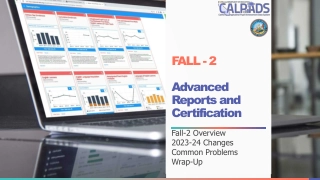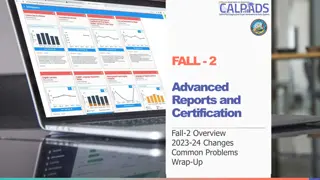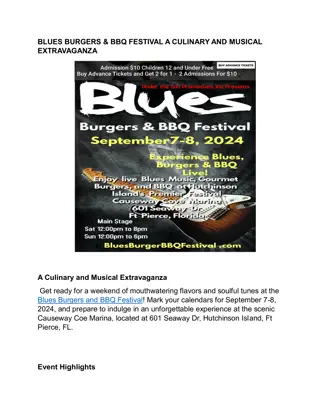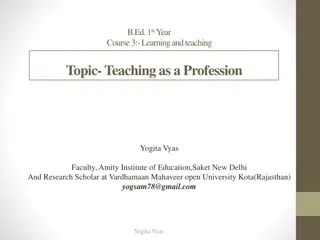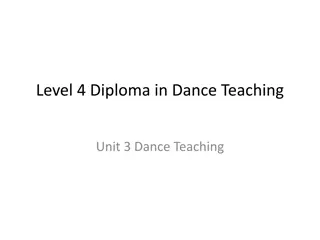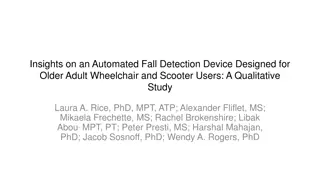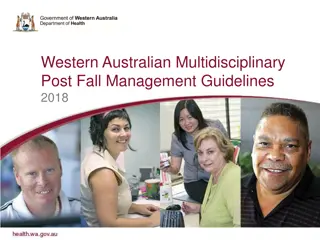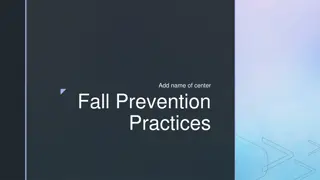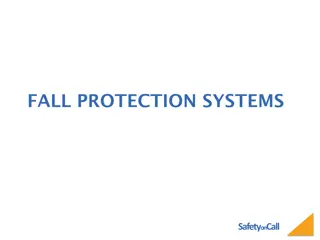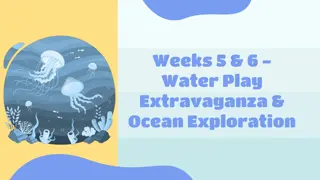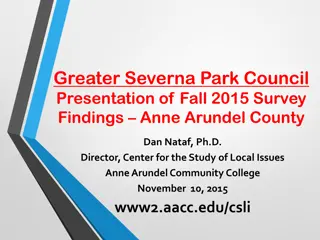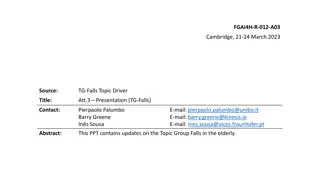
Academic Preparedness Challenges Post-Pandemic: Insights from Student Survey Data
Explore the impact of COVID-19 on academic preparedness based on student survey data, highlighting challenges in student engagement, socioeconomics, and learning outcomes. Gain insights on addressing these issues for the entering class of 2024.
Download Presentation

Please find below an Image/Link to download the presentation.
The content on the website is provided AS IS for your information and personal use only. It may not be sold, licensed, or shared on other websites without obtaining consent from the author. If you encounter any issues during the download, it is possible that the publisher has removed the file from their server.
You are allowed to download the files provided on this website for personal or commercial use, subject to the condition that they are used lawfully. All files are the property of their respective owners.
The content on the website is provided AS IS for your information and personal use only. It may not be sold, licensed, or shared on other websites without obtaining consent from the author.
E N D
Presentation Transcript
Agenda Academic context & preparedness for our FYS Entering student survey data Reflection and break Resources and programming Scope of practice activity
Academic Context Class of 2028 End of 8thgrade was disrupted due to COVID. They started high school virtually/hybrid/socially distanced and with limited co- curricular opportunities. The percent of U.S. students who are chronically absent (missing 10% or more of school) is up considerably post-pandemic ~13-15% pre-pandemic ~26-28% post-pandemic We may continue to see issues with Social interaction Managing stressors Increased absences https://www.nytimes.com/interactive/2024/03/29/us/chronic- absences.html
Academic Preparedness Most of our data comes from K 8 Pandemic recovery is a mixed bag and depends largely on Socioeconomic status Race/ethnicity Performance pre-COVID The average student will need the equivalent of 4.8 additional months of schooling to catch up in reading and 4.4 months in math. Latest NWEA Research Shows COVID Academic Recovery Still Elusive - NWEA Good And Bad News As Students And Teachers Return To School (forbes.com)
Academic Preparedness Only 14% of 13-year olds report reading for fun almost every day, down from 27% in 2012. The entering class of 2024 likely had their algebra learning impacted, but it s hard to know the extent. 2023 ACT scores were the lowest they ve been in 30 years. NAEP Long-Term Trend Assessment Results: Reading and Mathematics https://blog.prepscholar.com/average-act-score-by-year
Academic Preparation ACT survey of the incoming class of 2024. 86% of students reported that they were prepared to earn grades of B or higher in most college courses But .percentages of surveyed students who met the ACT College Readiness Benchmarks were 74% for English 48% for Math 63% for Reading 54% for Science https://www.act.org/content/dam/act/unsecured/documents/Supports -Key-College-Preparation-Students-COVID-Cohort.pdf
What to do? Now more than ever we need to Think about what assumptions we are making about what your students know/can do. Make our expectations clear and hold students accountable for meeting them early. Assess our students level of preparation. Refer, refer, refer.
Entering student survey data 560 students responded to the UWSP 2024 Entering Student Survey (Stevens Point campus only) 40% are first-generation college students; 60% are continuing-generation college students. Why 1st-gen status matters: the literature (How Are 1st-Generation Students Doing Throughout Their College Years? and Should I Stay or Should I Go?) Why 1st-gen status matters: our campus.
Entering student survey data 1st-gen students are more likely than continuing-gen students to be worried about the following: o Meeting their financial obligations o Knowing which courses to take o Modifying the study skills they developed in high school or learning new study skills to ensure that they can meet their professors' academic expectations o Knowing where to find help with course content or with the development of effective study skills or time-management skills o Knowing when to ask for help managing their mental and/or physical health o Knowing where to find help managing their mental and/or physical health o Affording necessities like food, utilities, and transportation
Entering student survey data Moreover, 1st-gen students are more likely than continuing-gen students to lack confidence in their ability to do the following: o Understand critical university policies, procedures, deadlines, etc. or know how to find more information about policies, etc. they don t understand Find information about co-curricular, social, or career-related events and activities on campus Develop effective study habits Recognize when they struggle to understand course content, and ask for help with course material when needed Set goals for course performance, and know how to ask for help, as needed, in achieving those goals Set long-term academic and professional goals, and know how to ask for help, as needed, in achieving those goals Develop and apply the critical thinking skills needed to solve problems Manage their money and have a plan for financing their college education o o o o o o o
Entering student survey data Finally, 1st-gen students are less likely than their continuing-generation peers to have taken AP or Honors courses in high school, with 78% of continuing-gen students and 62% of 1st-gen students having participated in some form of advanced academic programming in high school. The discrepancy becomes more pronounced when considering 1st-gen students of color, only 44% of whom participated in advanced academic programming in high school. Why did I save this point for last?
Entering student survey data Levels of concern and confidence in four key areas knowing what professors expect academically, developing effective study skills, knowing when to ask for help, and handling the academic rigor of college courses differ less than you might expect between students who participated in advanced academic programming in high school and students who did not.
Reflection and Break Time! Questions for reflection: What are 3 5 things in your discipline that you take for granted that might be new to students? What does the data about pandemic recovery and our new student survey mean for your fall courses? Please help yourself to more snacks/coffee, use the restroom, etc.
Challenge: Student Behaviors COLS week 3 pilot o Volunteer participants from large courses typically serving first-year students will indicate which students are not / have not been attending. o Residence life and retention staff will connect with identified students. o Office of Student Retention will look for patterns using 3rd-, 5th- & 8th-week attendance data. CITL email scripts for faculty o Navigate leadership team is working on a way to store these scripts/ templates in Navigate Navigate alerts o Navigate leadership team is working to streamline the process of "closing the loop" on alerts you should see case closures within two weeks
Challenge: Mental Health Mantra Whole Campus Care Pilot Self-care Wellness coaching Peer communities 24/7 support Therapy Mental health course for faculty/instructors.
Challenge Artificial Intelligence Book club on "Teaching with AI" o System-wide events with author Jos Bowen in Oct. Web resources Academic integrity resources Decision guides Workshops Brown bags
Challenge Civil Discourse & the Election Teaching Tips Academic Freedom and Free Speech Resource Guide Downloadable classroom resources Brown bags
Scope of Practice Activity What is a Scope of Practice (SoP)? o Most common in healthcare fields Helps to identify procedures, actions, and processes an individual is permitted/expected to perform. Aim to protect the needs of both the practitioner and the patient.
Scope of Practice for Educators According to Karen Costa, creating an SoP helped her figure "out what belonged to me inside the walls, whether brick or virtual, of the classrooms I shared with my students." Her SoP "speaks to spaces where I have felt the need for clearer boundaries, as well as common frustrations, concerns, and missteps I've witnessed in the field." Costa, K. (2022). An Educator s Scope of Practice: How Do I Know What s Mine?. In: Thompson, P., Carello, J. (eds) Trauma-Informed Pedagogies. Palgrave Macmillan, Cham. https://doi.org/10.1007/978-3-030-92705-9_15
My hopes for this activity Help you to think intentionally about your role at UWSP. Provide a framework for having broader conversations about roles and roles and responsibilities, as they relate to teaching and learning.
What this activity isn't A ploy to get faculty to take on more. An excuse for faculty to take a "not my problem" stance to issues in the classroom.
Before we begin... The full guide has links to resources that you can use to help make referrals. A copy will be sent to you.
Step 1: As a table discuss the following: What do students need to do to be successful in college? Write your answers on the sticky notes provided and arrange in column.
Step 2: For each item you identified in Step 1, discuss In what ways are you responsible for providing the necessary support for each? Focus on things that clearly fall within your role and that you are qualified to do. SUPER IMPORTANT: it is 100% okay to decide you have no role to play! Add each sticky to the correct row.
Step 3: For each item you identified in Step 1, discuss Who else on campus has some (or all) of the responsibility to provide the necessary support? IMPORTANT: It's okay if you don't know. Write that on your sticky. Add each sticky to the correct row.
Personal Scope of Practice As you engaged in the previous conversation, which topics brought up frustration or confusion? Are there other topics related to your role that bring up frustrations or confusion? What areas within your role do you struggle to set or enforce boundaries?
Mine = the things that fall within your responsibilities and qualifications based on your role in higher education Not mine = the things that fall outside of your responsibilities and qualification based on your role in higher education You can be as broad or as granular as you would like. This is your SoP.
Mine Not mine Making the required pre-requisite knowledge clear, posting review content to Canvas, quizzing students on it. Reteaching material during class. Listen with empathy. Reach out to students who I am concerned about and/or issue a Navigate referral. Offer a 48-hour no-penalty extension on all assignments with limited extensions beyond that. Provide counseling. Personally track down every student who isn't doing well. Create individualized solutions for every student emergency that comes up.
Take your SoP with you. Post it where you can see it. Refer to it often. Update it is needed.


